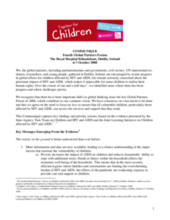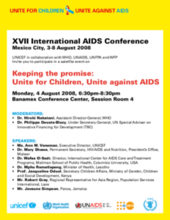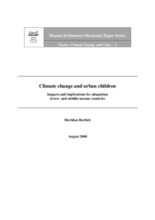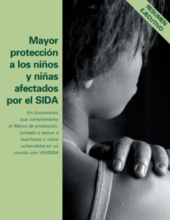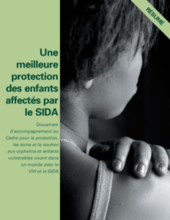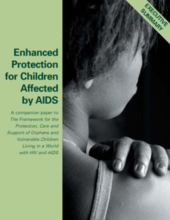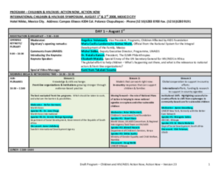Displaying 4011 - 4020 of 4431
Summary of past successes and future priorities in responding to children affected by HIV and AIDS
BCN is collecting resources to be included in our new toolkit for practicioners supporting the delivery of better care to children and youth.
BCN is collecting resources to be included in our new toolkit for practicioners supporting the delivery of better care to children and youth.
UNICEF, together with WHO, UNAIDS, UNFPA and WFP, invites you to the Mexico 2008 AIDS satellite session on "Keeping the promise: Unite for Children. Unite against AIDS". The session will take place on Monday, 4 August, from 6:30PM to 8:30PM in the Banamex Conference Center, Session Room 4.
This paper discusses the probable impacts for children of different ages from the increasing risk of storms, flooding, landslides, heat waves, drought and water supply constraints that climate change is likely to bring to most urban centres in Africa, Asia and Latin America.
Examines the importance of clarifying global understanding of the word and the implications of such.
Outlines how to strengthen social protection, legal protection, and alternative care for children at country level. Contains specific actions that governments and NGO's can take to decrease the vulnerability of children affected by AIDS and respond to instances of abuse, exploitation and neglect.
Outlines how to strengthen social protection, legal protection, and alternative care for children at country level. Contains specific actions that governments and NGO's can take to decrease the vulnerability of children affected by AIDS and respond to instances of abuse, exploitation and neglect.
Outlines how to strengthen social protection, legal protection, and alternative care for children at country level. Contains specific actions that governments and NGO's can take to decrease the vulnerability of children affected by AIDS and respond to instances of abuse, exploitation and neglect.
International Children & HIV/AIDS Symposium, August 1st & 2nd

